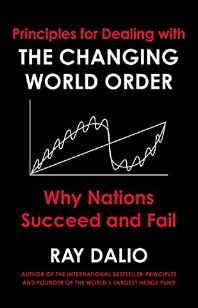
Principles for Dealing with the Changing World Order: Why Nations Succeed and Fail
“A few years ago, Ray Dalio noticed a confluence of political and economic conditions he hadn’t encountered before. They included huge debts and zero or near-zero interest rates that led to massive printing of money in the world’s three major reserve currencies; big political and social conflicts within countries, especially the US, due to the largest wealth, political, and values disparities in more than 100 years; and the rising of a world power (China) to challenge the existing world power (US) and the existing world order. The last time that this confluence occurred was between 1930 and 1945. This realisation sent Dalio on a search for the repeating patterns and cause/effect relationships underlying all major changes in wealth and power over the last 500 years. Dalio brings readers along for his study of the major empires including the Dutch, the British, and the American, putting into perspective the “Big Cycle” that has driven the successes and failures of all the world’s major countries throughout history. He reveals the timeless and universal forces behind these shifts and uses them to look into the future, offering practical principles for positioning oneself for what’s ahead.”
I thought predicting the future was futile because it was too random and too different from the past. This book demonstrates the opposite. Because history is a cycle, we can anticipate what’s to come provided we know where we are in the cycle. History as a cycle (instead of history as a straight line) is not a farfetched idea. Humans have a hard time learning the lessons of their elders. Pushed by envy, jealousy, and laziness, they make the same mistakes and so the whole thing starts again, in a never-ending cycle. Because Ray Dalio shows how history repeats over lifetimes, this book is a blueprint for the development of an empire, and a manual against its decadence. It’s a book every politician in the world should read. Yet, it’s not without fault. The book is too long, too specific at times, and too repetitive. The author introduces too much of what he is about to say. Like most books, the most important part is the first 20% of the book. The rest is interesting, but not as much as the beginning.
Short Summary of Principles for Dealing with the Changing World Order
Two cycles govern the rise and fall of nations and empires.
The first one is the Long-term Debt Cycle. In the beginning, debt levels are low, borrowers borrow money, and they invest and create wealth so the productivity, wealth, and standards of living of the country rise. When the country peaks economically, the population becomes lazy and decadent. People no longer borrow to invest and create. They borrow to consume and rest. As a result, the country becomes less innovative and its power declines until the high level of debt triggers financial and socio-economic crises, and sometimes, wars. This leads the country to collapse and the cycle starts again. Low levels of debt, etc.
The second cycle is the Cycle of Internal Order. It looks at how people behave with each other. Do they respect the law? Do they help each other? Are they well educated? Do they work hard? When people are poor, they are willing to work hard to become rich and improve their lives. When they’re already rich, they’re not willing to do so. They become lazy and entitled. The country loses economic power, people become poorer, and start to fight over resources. The country declines and sometimes, disappears.
These two cycles (which happen simultaneously on top of each other) influence the World Order Cycle. Whichever country is the strongest establishes its own World Order. When this country declines while another one rises, the World Order is up for a change. The World Order switch happens when the upcoming country is clearly stronger than the former country, which often happens when the former country loses a war against the upcoming one.
All nations have risen and fallen in the same way by doing the same things. This is why nations that rise, eventually fall.
Robin Sellers
March 2023
